- Home
- Lisa Kleypas
Sugar Daddy Page 2
Sugar Daddy Read online
Page 2
I was to find out later it was the habit of some residents from the trailer park, including Mr. Sadlek, to visit a neighbor’s field for target practice. They shot at a row of yard flamingos that bobbed and sprang back whenever they were shot. When a flamingo was too full of holes to be useful, it was strategically placed at the front entrance of the trailer park as an advertisement of the residents’ shooting skills.
An OPEN sign hung in the little side window by the front door. Reassured by Hardy’s solid presence beside me, I went to the front door, knocked tentatively and pushed it open.
A Latina cleaning lady was busy mopping the entranceway. In the corner, a cassette player spat out the cheerful polka rhythm of tejano music. Glancing upward, the girl spoke in rapid-fire Spanish. “Cuidado, el piso es mojado.”
I only knew a few words of Spanish. Having no idea what she had meant, I shook my head apologetically. But Hardy replied without missing a beat, “Gracias, tendremos cuidados.” He put a hand on the center of my back. “Careful. The floor’s wet.”
“You speak Spanish?” I asked him in mild surprise.
His dark brows lifted. “You don’t?”
I shook my head, abashed. It had always been a source of vague embarrassment that despite my heritage I couldn’t speak my father’s language.
A tall, heavy figure appeared in the doorway of the front office. At first glance Louis Sadlek was a good-looking man. But it was a ruined handsomeness, his face and body showing the decay of habitual self-indulgence. His striped Western shirt had been left untucked in an effort to hide the billow of his waist. Although the fabric of his pants looked like cheap polyester, his boots were made of blue-dyed snakeskin. His even, regular features were marred by the florid bloat around his neck and cheeks.
Sadlek stared at me with casual interest, his lips pulling back in a dirty joke of a smile. He spoke to Hardy first. “Who’s the little wetback?”
Out of the corner of my eye, I saw the cleaning lady stiffen and pause in her scrubbing. It seemed she had been exposed to the word often enough to know its meaning.
Seeing the instant tension in Hardy’s jaw, and the clenching of the fist at his side, I broke in hastily. “Mr. Sadlek, I’m—”
“Don’t call her that,” Hardy said in a tone that made the hairs rise on the back of my neck.
They stared at each other with palpable animosity, their gazes level. A man well past his prime, and a boy who hadn’t yet entered it. But there was no doubt in my mind how it would have ended if there had been a fight.
“I’m Liberty Jones,” I said, trying to smooth the moment over. “My mother and I are moving into the new trailer.” I dug the envelope from my back pocket and extended it to him. “She told me to give you this.”
Sadlek took the envelope and tucked it into his shirt pocket, letting his gaze slide over me from head to toe. “Diana Jones is your mama?”
“Yes, sir.”
“How’d a woman like that get a little dark-skinned girl like you? Your daddy musta been a Mexican.”
“Yes, sir.”
He gave a scornful snicker and shook his head. Another grin eased across his mouth. “You tell your mama to drop off the rent check herself next time. Tell her I got stuff I want to talk about.”
“All right.” Eager to be out of his presence, I tugged at Hardy’s rigid arm. After a last warning glance at Louis Sadlek, Hardy followed me to the door.
“You’d best not run with white trash like the Cateses, little girl,” Sadlek called out after us. “They’re trouble. And Hardy’s the worst of the lot.”
After a scant minute in his presence, I felt as if I’d been wading through chest-high garbage. I turned to glance at Hardy in amazement.
“What a jerk,” I said.
“You could say that.”
“Does he have a wife and kids?”
Hardy shook his head. “Far as I know, he’s been divorced twice. Some women in town seem to think he’s a catch. You wouldn’t know it to look at him, but he’s got some money.”
“From the trailer park?”
“That and a side business or two.”
“What kind of side business?”
He let out a humorless laugh. “You don’t want to know.”
We walked to the loop intersection in contemplative silence. Now that evening was settling there were signs of life at the trailer park…cars turning in, voices and televisions filtering through the thin walls, smells of frying food. The white sun was resting on the horizon, bleeding out color until the sky was drenched in purple and orange and crimson.
“Is this it?” Hardy asked, stopping in front of my white trailer with its neat girdle of aluminum siding.
I nodded even before I saw the outline of my mother’s profile in the window of the kitchenette. “Yes, it is,” I exclaimed with relief. “Thank you.”
As I stood there peering up at him through my brown-framed glasses, Hardy reached out to push back a piece of hair that had straggled loose from my ponytail. The callused tip of his finger was gently abrasive against my hairline, like the tickle of a cat’s tongue. “You know what you remind me of?” he asked, studying me. “An elf owl.”
“There’s no such thing,” I said.
“Yes there is. They mostly live to the south in the Rio Grande Valley and beyond. But every now and then an elf owl makes its way up here. I’ve seen one.” He used his thumb and forefinger to indicate a distance of five inches. “They’re only about this big. Cute little bird.”
“I’m not little,” I protested.
Hardy smiled. His shadow settled over me, blocking the light of sunset from my dazzled eyes. There was an unfamiliar stirring inside me. I wanted to step deeper into the shadow until I met his body, to feel his arms go around me. “Sadlek was right, you know,” he said.
“About what?”
“I am trouble.”
I knew that. My rioting heart knew it, and so did my weak knees, and so did my heat-prickling stomach. “I like trouble,” I managed to say, and his laugh curled through the air.
He walked away in a graceful long-legged stride, a dark and solitary figure. I thought of the strength in his hands as he had picked me up from the ground. I watched him until he had disappeared from sight, and my throat felt thick and tingly like I’d just swallowed a spoonful of warm honey.
The sunset finished with a long crack of light rimming the horizon, as if the sky were a big door and God was taking one last peek. Good night, Welcome, I thought, and went into the trailer.
Chapter 2
My new home smelled agreeably of fresh-molded plastic and new carpeting. It was a two-bedroom single-wide with a concrete patio pad in the back. I’d been allowed to pick out the wallpaper in my room, white with bunches of pink roses and a narrow blue ribbon woven throughout. We had never lived in a trailer before, having occupied a rent house in Houston before we moved east to Welcome.
Like the trailer, Mama’s boyfriend, Flip, was a new acquisition. He’d gotten his name from his habit of constantly flipping through TV channels, which hadn’t been so bad at first but after a while it drove me crazy. When Flip was around, no one could watch more than five minutes of any one show.
I was never sure why Mama invited him to live with us—he seemed no better or different than any of her other boyfriends. Flip was like a friendly, oversized dog, good-looking and lazy, with the hint of a beer belly, a shaggy mullet, and an easy grin. Mama had to support him financially from day one, with her salary as a receptionist at the local title company. Flip, on the other hand, was perpetually unemployed. Although Flip had no objection to having a job, he was strongly opposed to the concept of actually looking for one. It was a common redneck paradox.
But I liked Flip because he made Mama laugh. The sound of those elusive laughs was so precious to me, I wished I could capture one in a Mason jar and keep it forever.
As I walked into the trailer, I saw Flip stretched out on the sofa with a beer in hand while Mama stacked c
ans in a kitchen cabinet.
“Hey, Liberty,” he said easily.
“Hey, Flip.” I went into the kitchenette to help my mother. The fluorescent ceiling light shone on the glasslike smoothness of her blond hair. My mother was fine-featured and fair, with mysterious green eyes and a vulnerable mouth. The only clue to her monumental stubbornness was the sharp, clean line of her jaw, vee-shaped like the prow of an ancient sailing ship.
“Did you give the check to Mr. Sadlek, Liberty?”
“Yes.” I reached for sacks of flour, sugar, and cornmeal, and stowed them in the pantry. “He’s a real jerk, Mama. He called me a wetback.”
She whipped around to face me, her eyes blazing. A flush covered her face in delicate red patches. “That bastard,” she exclaimed. “I can’t believe—Flip, did you hear what Liberty just said?”
“Nope.”
“He called my daughter a wetback.”
“Who?”
“Louis Sadlek. The property manager. Flip, get off your ass and go talk to him. Right now! You tell him if he ever does that again—”
“Now, honey, that word don’t mean nothing,” Flip protested. “Everyone says it. They don’t mean no harm.”
“Don’t you dare try to justify it!” Mama reached out and pulled me close, her arms wrapping protectively around my back and shoulders. Surprised by the strength of her reaction—after all, it wasn’t the first time the word had been applied to me and certainly wouldn’t be the last—I let her hold me for a moment before wriggling free.
“I’m okay, Mama,” I said.
“Anyone who uses that word is showing you he’s ignorant trash,” she said curtly. “There’s nothing wrong with being Mexican. You know that.” She was more upset for my sake than I was.
I had always been acutely aware that I was different from Mama. We garnered curious glances when we went anywhere together. Mama, as fair as an angel, and me, dark-haired and obviously Hispanic. I had learned to accept it with resignation. Being half-Mexican was no different than being all-Mexican. That meant I would sometimes be called a wetback even though I was a natural-born American and had never set so much as a toe in the Rio Grande.
“Flip,” Mama persisted, “are you going to talk to him?”
“He doesn’t have to,” I said, regretting having told her anything. I couldn’t imagine Flip going to any trouble for something he plainly considered to be a minor issue.
“Honey,” Flip protested, “I don’t see no point in making trouble with the landlord on our first day—”
“The point is you should be man enough to stand up for my daughter.” Mama glared at him. “I’ll do it, damn it.”
A long-suffering groan from the sofa, but there was no movement save the flick of his thumb on the remote control.
Anxiously I protested, “Mama, don’t. Flip’s right, it didn’t mean anything.” I knew in every cell of my body that my mother must be kept away from Louis Sadlek.
“I won’t be long,” she said stonily, looking for her purse.
“Please, Mama.” I searched frantically for a way to dissuade her. “It’s time for dinner. I’m hungry. Really hungry. Can we go out to eat? Let’s try out the town cafeteria.” Every adult I knew, including Mama, liked going to the cafeteria.
Mama paused and glanced at me, her face softening. “You hate cafeteria food.”
“It’s grown on me,” I insisted. “I’ve started to like eating out of trays with compartments.” Seeing the beginnings of a smile on her lips, I added, “If we’re lucky it’ll be senior citizens’ night and we can get you in for half-price.”
“You brat,” she exclaimed, laughing suddenly. “I feel like a senior citizen after all this moving.” Striding into the main room, she turned off the TV and stood in front of the fading screen. “Up, Flip.”
“I’m gonna miss WrestleMania,” he protested, sitting up. One side of his shaggy head was flattened from lying on a cushion.
“You won’t watch the whole thing anyway,” Mama said. “Now, Flip…or I’ll hide the remote for an entire month.”
Flip heaved a sigh and got to his feet.
The next day I met Hardy’s sister, Hannah, who was a year younger than me but almost a head taller. She was striking rather than pretty, with a long-limbed athleticism that was common to the Cateses. They were physical people, competitive and prankish and completely the opposite of everything I was. As the only girl in the family, Hannah had been taught never to back down from a dare, and to rush headlong into every challenge no matter how impossible it seemed. I admired such recklessness even if I didn’t share it. It was a curse, Hannah informed me, to be adventurous in a place where there was no adventure to be found.
Hannah was crazy about her older brother and loved to talk about him nearly as much as I loved to hear about him. According to Hannah, Hardy had graduated last year but was dating a senior named Amanda Tatum. He’d had girls throwing themselves at him since the age of twelve. Hardy spent his days building and repairing barbed-wire fencing for local ranchers, and had made the down payment on his mama’s pickup. He’d been a fullback on the football team before he’d torn some ligaments in his knee, and he had run the forty-yard dash in 4.5 seconds. He could imitate the song of nearly any Texas bird you could name, from a chickadee to a wild turkey. And he was kind to Hannah and their two young brothers, Rick and Kevin.
I thought Hannah was the luckiest girl in the world to have Hardy for a brother. As poor as her family was, I envied her. I’d never liked being an only child. Whenever I was invited to a friend’s house for dinner, I felt like a visitor to a foreign land, absorbing how things were done, what was said. I especially liked families that made a lot of commotion. Mama and I were quiet-living, and even though she assured me two people could be a family, ours didn’t seem complete.
I had always hungered for family. Everyone else I knew was familiar with their grandparents and great-uncles and second and third cousins and all the distant relations that met up for reunions once every year or two. I never knew my relatives. Daddy had been an only child like me, and his parents were dead. The rest of his people were scattered around the state. His family, the Jimenezes, had lived for generations in Liberty County. That was how I got my name, actually. I was born in the town of Liberty, a little northeast of Houston. The Jimenezes had settled there way back in the eighteen hundreds, when Mexico opened the area to colonists. Eventually the Jimenezes had renamed themselves the Joneses, and they either died off or sold their land and moved away.
That left only Mama’s side of the family. Whenever I asked her about them, she turned cold and quiet, or snapped at me to go play outside. One time I saw her crying afterward, sitting on the bed with her shoulders hunched over as if they were laden with invisible weights. After that I never asked her about her family again. But I knew her maiden name. Truitt. I wondered if the Truitts even knew I existed.
But most of all I wondered, what had Mama done that was so bad her own family didn’t want her anymore?
Despite my worries Hannah insisted on taking me to meet Miss Marva and her pit bulls even after I protested they’d scared the wits out of me.
“You better go make friends with ’em,” Hannah had warned. “Someday they’ll get past the gate and run loose again, but they won’t bother you if they know you.”
“You mean they just eat strangers?”
I didn’t think my cowardice was unreasonable under the circumstances, but Hannah rolled her eyes. “Don’t be a scaredy-cat, Liberty.”
“Do you know what happens to people who get dog-bitten?” I asked indignantly.
“No.”
“Blood loss, nerve damage, tetanus, rabies, infection, amputation…”
“Gross,” Hannah said admiringly.
We were walking along the main drive of the trailer park, our sneakers kicking up pebbles and dust clouds. The sunlight bore down on our uncovered heads and burned the thin lines of our parted hair. As we neared the Cateses’ lot I saw H
ardy washing his old blue truck, his bare back and shoulders gleaming like a new-minted penny. He wore denim shorts, flip-flops, and a pair of aviator sunglasses. His teeth flashed white in his tanned face as he smiled, and something pleasurable caught in my midsection.
“Hey, there,” he said, rinsing swirls of foam from the pickup, his thumb partially capping the end of the hose to increase the pressure of the spray. “What are you up to?”
Hannah answered for both of us. “I want Liberty to make friends with Miss Marva’s pit bulls, but she’s scared.”
“I’m not,” I said, which was not at all true, but I didn’t want Hardy thinking I was a coward.
“You were just telling me all the stuff that could happen if you get bitten,” Hannah pointed out.
“That doesn’t mean I’m scared,” I said defensively. “It means I’m well informed.”
Hardy gave his sister a warning glance. “Hannah, you can’t push someone to do something like that before they’re ready. You let Liberty deal with it in her own time.”
“I want to,” I insisted, abandoning all common sense in favor of pride.
Hardy went to turn off the hose, pulled a white T-shirt from a nearby umbrella-shaped laundry rack, and tugged it over his lean torso. “I’ll come with you. Miss Marva has been after me to carry some of her paintings to the art gallery.”
“She’s an artist?” I asked.
“Oh, yes,” Hannah said. “Miss Marva does bluebonnet paintings. Her stuff is real pretty, isn’t it, Hardy?”
“It is,” he said, coming to tug gently on one of his sister’s braids.
As I watched Hardy, I felt the same puzzling yearning I had before. I wanted to draw closer to him, to investigate the scent of his skin beneath the layer of bleached cotton.
Hardy’s voice seemed to change a little when he spoke to me. “How your knees doing, Liberty? Are they still sore?”

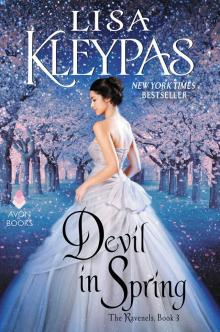 Devil in Spring
Devil in Spring Sugar Daddy
Sugar Daddy Devil in Winter
Devil in Winter Dreaming of You
Dreaming of You Christmas Eve at Friday Harbor
Christmas Eve at Friday Harbor Love, Come to Me
Love, Come to Me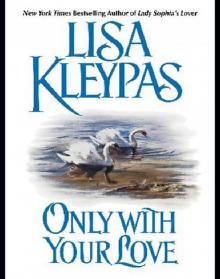 Only With Your Love
Only With Your Love Suddenly You
Suddenly You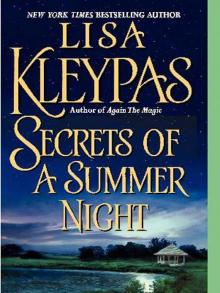 Secrets of a Summer Night
Secrets of a Summer Night Cold-Hearted Rake
Cold-Hearted Rake Where's My Hero?
Where's My Hero? Gifts of Love
Gifts of Love Married by Morning
Married by Morning Then Came You
Then Came You Wish List
Wish List Where Dreams Begin
Where Dreams Begin A Historical Christmas Present
A Historical Christmas Present Somewhere I'll Find You
Somewhere I'll Find You Scandal in Spring
Scandal in Spring Someone to Watch Over Me
Someone to Watch Over Me Worth Any Price
Worth Any Price Prince of Dreams
Prince of Dreams It Happened One Autumn
It Happened One Autumn Love in the Afternoon
Love in the Afternoon Devil's Daughter
Devil's Daughter A Wallflower Christmas
A Wallflower Christmas Tempt Me at Twilight
Tempt Me at Twilight Brown-Eyed Girl
Brown-Eyed Girl Mine Till Midnight
Mine Till Midnight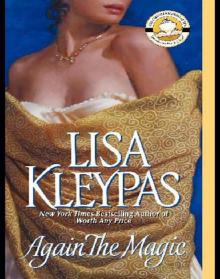 Again the Magic
Again the Magic Lady Sophia's Lover
Lady Sophia's Lover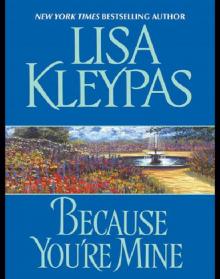 Because You're Mine
Because You're Mine Midnight Angel
Midnight Angel Smooth-Talking Stranger
Smooth-Talking Stranger Blue-Eyed Devil
Blue-Eyed Devil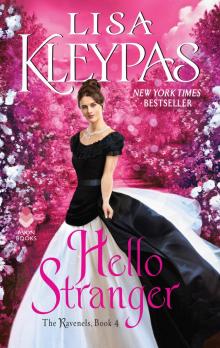 Hello Stranger
Hello Stranger Dream Lake
Dream Lake Devil's Daughter: The Ravenels Meet the Wallflowers
Devil's Daughter: The Ravenels Meet the Wallflowers A Christmas to Remember
A Christmas to Remember Smooth Talking Stranger
Smooth Talking Stranger Crystal Cove
Crystal Cove Marrying Winterborne
Marrying Winterborne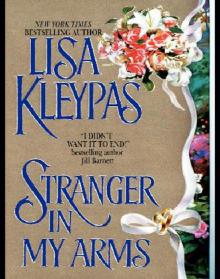 Stranger in My Arms
Stranger in My Arms Devil in Disguise
Devil in Disguise Worth Any Price bsr-3
Worth Any Price bsr-3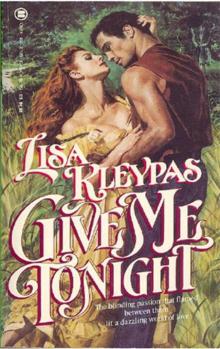 Give Me Tonight
Give Me Tonight Rainshadow Road fh-2
Rainshadow Road fh-2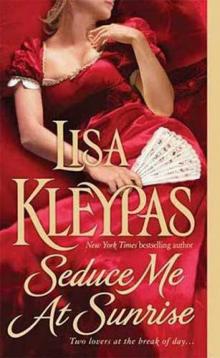 Seduce Me At Sunrise
Seduce Me At Sunrise I Will
I Will Someone to Watch Over Me bsr-1
Someone to Watch Over Me bsr-1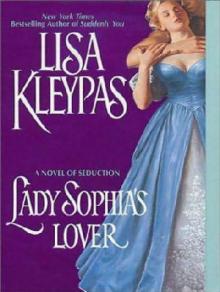 Lady Sophias Lover bsr-2
Lady Sophias Lover bsr-2 A Hathaway Wedding
A Hathaway Wedding A Hathaway Wedding (Hathaways Bk2.5)
A Hathaway Wedding (Hathaways Bk2.5) Worth Any Price - Bow Street 3
Worth Any Price - Bow Street 3 Christmas with Holly
Christmas with Holly